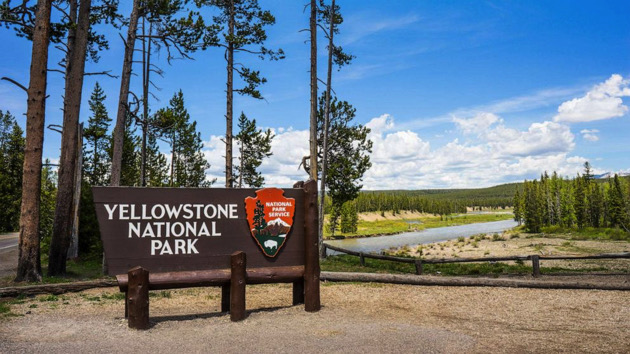(WEST YELLOWSTONE, Mont.) — A woman was found dead after what authorities say was “an apparent bear encounter” near Yellowstone National Park.
The woman’s body was discovered on Buttermilk Trail west of West Yellowstone, Montana, on Saturday morning, according to Montana Fish, Wildlife & Parks.
Authorities said grizzly bear tracks were found at the scene. An investigation is ongoing.
Citing human safety, the Custer Gallatin National Forest implemented an emergency closure of the Buttermilk Area, according to wildlife officials. The closure area is located about 8 miles from West Yellowstone.
The population of grizzly bears has grown in recent years, Montana Fish, Wildlife & Parks said in a statement.
Last month, a 66-year-old man was killed by a bear in Arizona in what authorities called a “highly unusual,” unprovoked attack.
The victim — identified as Steven Jackson, of Tucson — was in the process of building a cabin in the area, authorities said. He was sitting in a chair outside of his campsite when a bear attacked him, according to Yavapai County Sheriff David Rhodes.
In another bear-related incident, a 35-year-old sheepherder was attacked by a black bear in San Juan National Forest in Colorado on July 11, according to the state’s parks and wildlife department.
The man was severely wounded and sustained injuries to his head, left hand and arm, back and left hip, Colorado Parks and Wildlife said.
“This is an unfortunate incident and we are thankful the victim was able to contact help to get emergency services deployed and that he was able to be extracted to receive necessary medical care,” CPW Area Wildlife Manager Adrian Archuleta said in a news release.
The Montana Fish, Wildlife & Parks suggested people going outdoors in areas where there are bears, should follow some precautionary steps:
- Carry and know how to use bear spray.
- Travel in groups whenever possible and plan to be out in the daylight hours.
- Avoid carcass sites and concentrations of ravens and other scavengers.
- Watch for signs of bears such as bear scat, diggings, torn-up logs and turned-over rocks, and partly consumed animal carcasses.
- Make noise, especially near streams or in thick forest where hearing and visibility are limited, to alert bears to your presence.
- Don’t approach a bear.
ABC News’ Meredith Deliso contributed to this report.
Copyright © 2023, ABC Audio. All rights reserved.












